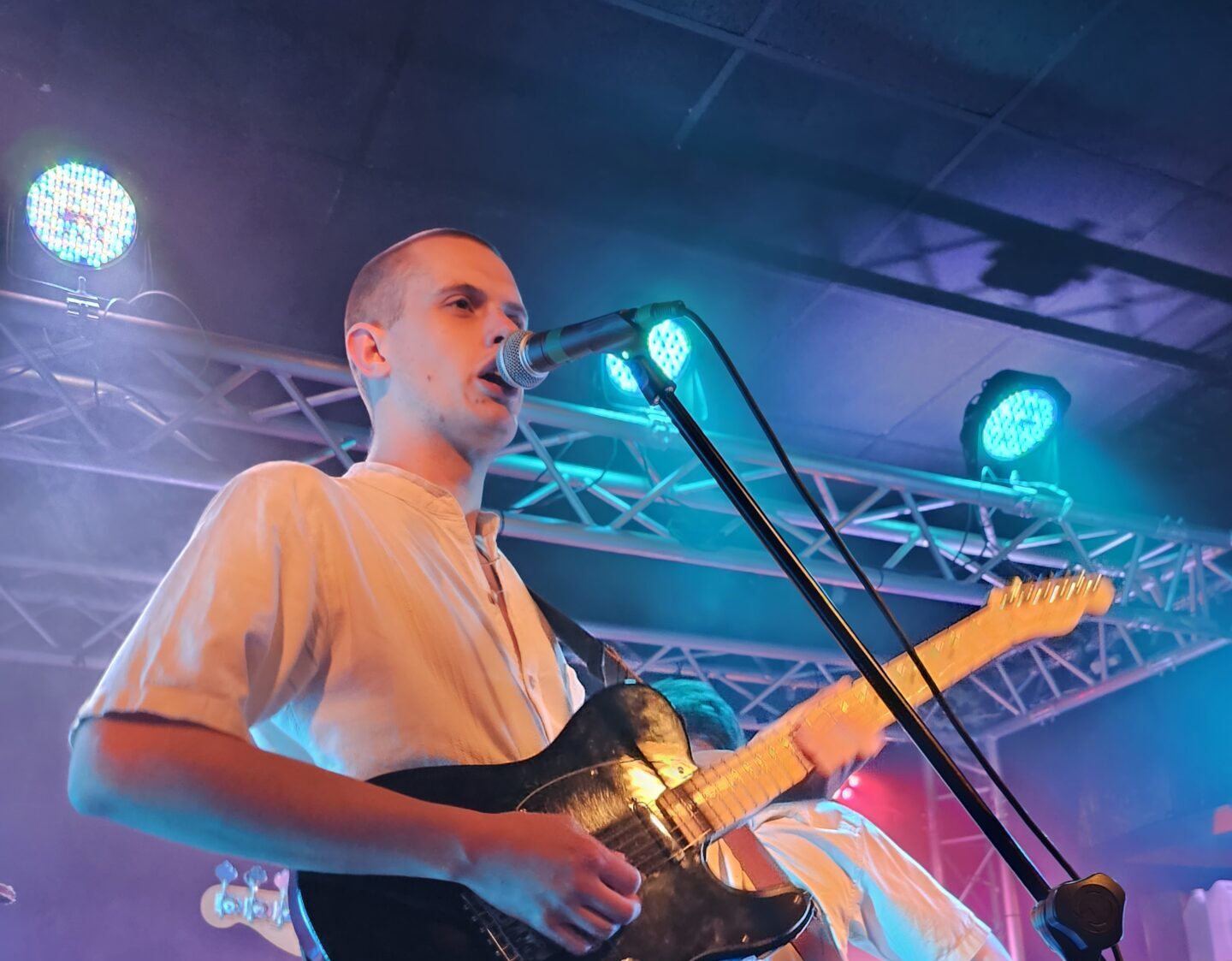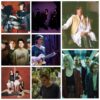Leeds five-piece Treeboy & Arc were born out of a project formed by James Kay (bass and vocals) and George Townend (guitar)’s teenage friendship. The description “the whole is greater than the sum of its parts” is so relevant here. Along with Ben Morgan (guitar and vocals) Sammy Robinson (synths) and Isaac Turner (drums) they moved in together transforming the damp basement into a rehearsal space, using large egg trays and carpet cut-offs as make-shift soundproofing. Treeboy & Arc release their debut album Natural Habitat on 7 July via Clue Records. Choosing to keep things homegrown, they worked alongside Leeds producer Matt Peel who has also worked with the likes of TRAAMS, W.H. LUNG and Pulled Apart By Horses.
As a way of introduction could you share how you got together as a band and each of the band members and their roles?
James plays bass and does vocals and George plays lead guitar, they’ve known each other for years and went to school together. Ben joined after meeting them when studying music together at college and does guitar and vocals. We had kind of known Isaac for a little while but after bumping into him at a New Years Eve party he joined in an official capacity on drums. Same with Sammy, we’d known him for a while and after buying a synth but realising there weren’t enough hands in the band to play it, Sammy joined to take up that responsibility.
Could you explain where the band name came from?
The band name is essentially nonsense and depending where you look on the internet you can probably find various different explanations of where the name came from. Its roots stem from a case of mistaken identity/misnomer when James and George were in School.
I understand you recorded Natural Habitat twice?
We recorded the album the first time round in sort of live capacity, we wanted to try and recreate the chaotic relentlessness of our live shows and translate that to a record. We were all playing all the instruments together in the same room and each track flowed into the next with no breaks. Unfortunately then the global pandemic hit and due to the nature of the album we didn’t want to release it without being able to play it live. Fast forward a year or two and we’d written and released an EP and generally just developed as a band and musicians. The album no longer felt current or like it represented us as a band so we made the decision to rewrite and tweak some songs and re-record it.
The album opens with ‘Midnight Mass’, which sounds nothing like the listener may expect. Static fuelled electronica along with a mainly spoken word vocal where every word can be heard. Could you share a little on the background of this opening track?
‘Midnight Mass‘ is probably the oldest song on the album and was one of the first songs we wrote where the music pivoted around the synth parts. We’d just bought a MicroKorg and were excited to write with it but realised we had pretty much no idea how to use it. The arpeggiator and dissonant pads in the chorus that you can hear in ‘Midnight Mass’ are the result of our initial experimentation. I think we all instantly fell in love with the idea of writing music that felt like it was constant and driving and I think that influence can be heard across all of our music since then.
Current single ‘Behind the Curtain’ is thrilling, cantering along at pace. What is your creative process?
Generally the way we write songs has always been the same. Usually one of the band will come into the rehearsal space with an idea – this could be a bassline or a synth sequence or something really small. For ‘Behind the Curtain‘ I think the idea came from Ben wanting to write a part in 5/4 – the guitar riff you can hear in between the spoken verses. From here we usually just tend to start playing and improvise around the idea for ages and then slowly start to pick out which bits sound good and start to refine them down, form a structure and eventually a song. Vocals usually come afterwards. We are currently writing the second album however and our creative process is changing somewhat. We’re finding ourselves more often in smaller groups rather than as a full band, playing different instruments and using recording software to help us to build song structures and arrange parts – something we have not done much in the past. Having focused so much of our energy on album 1 for so long we’re really excited to get moving on what’s coming next!
How does it feel to play your music live and interact with the crowd?
For us, playing live has always been the most enjoyable part of being in a band and also the thing I think we are probably best at. That’s exactly why we initially wanted to make the record sound like one of our live sets. At the time of writing a lot of the songs on this album we were all still pretty young and our live shows were pretty chaotic and crazy. I think we have definitely calmed down a little bit these days but we always go pretty hell for leather once we start playing and do our best to leave the stage with nothing left in the tank.
If I looked in your fridge right now what would I find?
Probably quite a lot of cheese and some beer. Most of us are vegetarians.
For more information on Treeboy & Arc check out their facebook and instagram.




